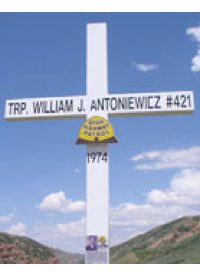
Reported the Associated Press: “Since 1998, the private Utah Highway Patrol Association has paid for and erected more than a dozen memorial crosses, most of them on state land. Texas-based American Atheists Inc. and three of its Utah members sued the state in 2005.” Two years later a federal court upheld the constitutionality of the crosses, but that ruling was later overturned by the 10th Circuit U.S. Court of Appeals in Denver.
In April the Alliance Defense Fund (ADF) took up the case on behalf of Utah and the Highway Patrol Association, asking the Supreme Court to review the case. ADF Senior Counsel Byron Babione expressed his disappointment in the High Court’s refusal. “One atheist group’s agenda shouldn’t diminish the sacrifice made by highway patrol officers and their families,” he said. “Thirteen heroic men fell, leaving their survivors to mourn and memorialize their loved ones, and now those widows, children, parents, colleagues, and many more must suffer through losing the very memorials that honored those heroes. Justice is not well served when unhappy atheists can use the law to mow down memorial crosses and renew the suffering for the survivors.”
Edwin Kagin, the national legal director for American Atheists, applauded the High Court’s refusal to hear the case, saying in a statement: “We are looking forward to the state of Utah upholding the opinion of the Court of Appeal and removing the crosses.” Dave Silverman, the group’s president, added: “It is our hope, now that the appeals process is over and the courts have found the crosses unconstitutional, that the State of Utah will find a more honorable and non-divisive way to honor their fallen troopers. The fallen troopers, their loved ones, and the citizens they swore to protect deserve such recognition.”
The lone dissenter in the High Court’s refusal was Clarence Thomas, who wrote that his fellow justices had missed “an opportunity to provide clarity to an Establishment Clause jurisprudence in shambles.” He called the 10th Circuit Court’s opinion “one of the latest in a long line of ‘religious display’ decisions that, because of this Court’s nebulous Establishment Clause analyses, turn on little more than ‘judicial predilections….’ Because our jurisprudence has confounded the lower courts and rendered the constitutionality of displays of religious imagery on government property anyone’s guess, I would grant certiorari.”
To demonstrate the apparently arbitrary nature of the High Court’s rulings on the issue, Thomas recalled a pair of Ten Commandments cases in 2005, in which, on the same day, the High Court ruled in favor of a Ten Commandments monument on the grounds of the Texas state capitol in Austin, while declaring a similar display in McCreary County courthouse in Kentucky unconstitutional.
As for Utah’s highway crosses, Thomas explained that, more that any other symbols, they “effectively and simultaneously conveyed the message of death, honor, remembrance, gratitude, sacrifice, and safety that the association wished to communicate to the public.”
The crosses, which are white and about 12 feet tall with six-foot crossbars, were donated by the Utah Highway Patrol Association and erected near where the troopers had died. Each cross includes a trooper’s name and photo, his badge number, biographical information, and a symbol of the Utah Highway Patrol.
As reported by World Net Daily, ADF attorneys had good reason for optimism that the Supreme Court would consider their appeal, in light of the Court’s April 2010 decision in Salazar vs. Buono in favor of a cross-shaped memorial standing in the Mojave Desert. Specifically addressing the roadside crosses erected for the fallen troopers, the Court wrote: “The goal of avoiding governmental endorsement does not require eradication of all religious symbols in the public realm. A cross by the side of a public highway marking, for instance, the place where a state trooper perished need not be taken as a statement of governmental support for sectarian beliefs. The Constitution does not oblige government to avoid any public acknowledgment of religion’s role in society.”
Noted Babione: “The Supreme Court’s decision not to hear this case is baffling in light of its comments just last year that individualized memorial crosses honoring fallen troopers do not amount to a government establishment of religion.”
Tony Perkins of the Family Research Council (FRC), which had provided a friend-of-the-court brief in support of the appeal, added his disappointment, saying that the Supreme Court had “failed to recognize that religious liberty is a fundamental right given to us by God and protected in the Constitution. I find it tragic that our freedoms are now at greater risk from our own courts than from the foreign or domestic enemies we’ve faced.”
In a press release FRC noted that the 10th Circuit’s order of the removal of the crosses in Utah “will affect five other states including Kansas, Colorado, Oklahoma, New Mexico, and Wyoming.” Warned Perkins: “None of their crosses on public property will be tolerated … and if this decision is ever applied nationally, as FRC’s amicus brief pointed out, Arlington National Cemetery and other landmarks would have to be completely dismantled. Of course, the irony is that these roadside crosses are not only constitutional, but they also represent the very values that our Constitution celebrates.”
Ken Klukowski, director of FRC’s Center for Religious Liberty and co-author of the court brief, said, “The Tenth Circuit Court of Appeals’ ordered removal of roadside crosses in six states is the worst example yet of the Establishment Clause being turned on its head to sterilize the public square of references to faith.” He added that religious freedom “means, in part, that no government should discriminate against those who, using their own funds, wish to erect a non-invasive religious display on public property.”


